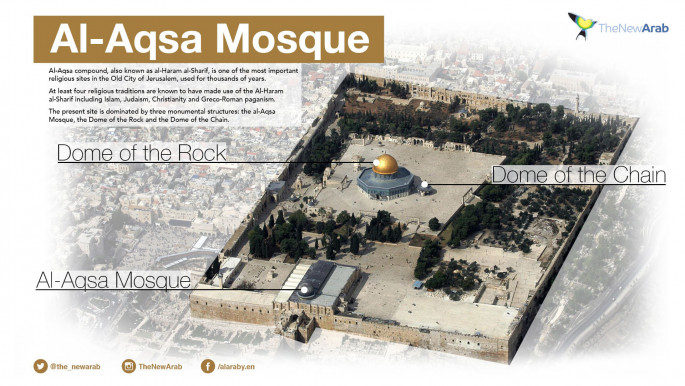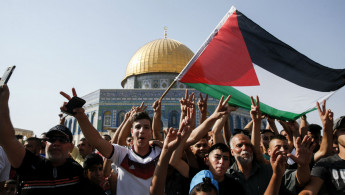Aqsa showdown a rare victory for Palestinians
Hundreds of Palestinians chanted and hugged each other as Israeli police removed the last security measures at the site late on Thursday, as car horns sounded incessantly.
Young men carried a huge Palestinian flag onto one of the Old City's walls, an extremely rare act in a city Israel considers it undivided capital.
Until 1993, the flag had been outlawed altogether.
"We feel joyous. I live quite far away but I walked here for Al-Aqsa," said Nisreen, a young woman in the crowd.
"The Israelis think this is it. God willing this is just the beginning."
 |
The Palestinian movement was called to the streets by the Waqf, but quickly took on a life of its own. |  |
Crisis point
The security measures had been put in place after an attack on July 14 that killed two Israeli policemen.
Israel argued that the measures were standard at major religious sites across the world, but Palestinians viewed it as altering the fragile status quo of a sensitive holy site located in occupied territory.
The Waqf, the Islamic endowments authority that runs al-Aqsa, refused to enter until the measures were removed.
Days of large street protests followed, with thousands mobilising to pray outside of the compound in a mass show of non-violent resistance.
The situation reached crisis point on July 21 as Israeli security forces killed three Palestinians in East Jerusalem and the occupied West Bank.
More than 900 Palestinians were also injured by Israeli forces in the large demonstrations.
Later that evening, a Palestinian broke into an Israeli settlement and stabbed three Israelis to death, with international warnings that the unrest could spiral out of control.
A top aide to US President Donald Trump flew in for crisis talks, while King Abdullah II of Jordan, the official custodian of Muslim holy sites in Jerusalem, urged Netanyahu to remove the security measures
The boycott continued on Tuesday after the metal detectors were removed but other new structures remained in place.
Two days later, Israeli police returned unannounced to the holy site and removed all remaining structures, prompting elation among Palestinians.
Mass non-violence
The Palestinian movement was called to the streets by the Waqf but quickly took on a life of its own.
"This cut across all lines -- religious, not so religious, Muslim, Christian, rich or poor," Diana Buttu, a former Palestinian official turned analyst, said.
According to Buttu and others, the Palestinian political leadership of all factions, including the internationally recognised leadership of the Palestinian Authority, had been mostly irrelevant, with the movement led largely by demonstrators.
"Palestinians have been very encouraged by what for them is one success within a sea of defeats," Ofer Zalzberg from the International Crisis Group think tank told AFP.
He put the victory down to an "Israeli inability to stop the movement because of the sheer size and because it was around Al-Aqsa."
Amid political infighting and a national movement divided between Gaza and the West Bank, al-Aqsa is a powerful unifying symbol for Palestinians - above all for Jerusalemites, who are politically leaderless.
For the masses of young people who participated in protests, mass collective action in Jerusalem provides an alternative structure through which to exert their demands.
"The next time there is a major issue, will they not go back to the same religious authorities and tell them: 'You were successful with the metal detectors. Why don't we do something?" Zalzberg said.
Capitulation
Israeli Prime Minsiter Binyamin Netanyahu was widely criticised in Israel for his handling of the crisis.
A poll of Israeli Jews found 77 percent thought the move to remove security measures constituted "capitulation", while even the normally pro-Netanyahu newspaper Israel Hayom attacked his handling of the crisis.
"There is a strong sense of humiliation, especially among the right wing," Zalzberg said.
 |
|
Netanyahu heads one of the most right-wing governments in Israel's history, and is under pressure to please his base.
He has since called for the death penalty for the Palestinian who killed three Israeli settlers, in what analysts say is a move designed to mitigate concessions at al-Aqsa.



